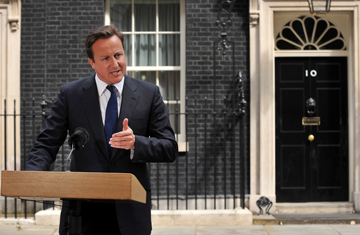
British Prime Minister David Cameron addresses the media outside 10 Downing Street in London on Aug. 10, 2011, following a fourth night of violence in Britain
British Prime Minister David Cameron's leadership is gradually being defined by the riots that have blazed across the U.K. — and he is determined to be portrayed as the toughest hombre in town, the man to clean up the lawless inner cities by any means necessary.
Gone is "Hug-a-Hoodie" Cameron — a label stuck to him after a speech in July 2006 in which he said antisocial youngsters often needed to feel more love — and in its place is "Hang 'Em High" Cameron, who has authorized the use of water cannons and plastic bullets to combat the rioters, even though it has emerged that the police do not believe they need those things.
On Tuesday, the Prime Minister, in effect, gave himself 48 hours to end the rioting and bring peace back to the streets of Britain's cities. To that end, he trebled to 16,000 the number of police available in London and promised to update a recalled Parliament on Thursday on the success, or otherwise, of his fight back.
But while the move to flood the capital city with riot police appeared to do the trick, with no serious disturbances on Tuesday night, it was at the cost of making London seem like a city under police occupation. Streets were deserted apart from lines of police trucks, shops and businesses put up their shutters and closed early, and residents stayed home behind locked doors. The bad news was that the riots had moved into the U.K.'s next biggest cities: Birmingham, where three men were killed in a hit-and-run incident, Manchester and Liverpool. In those places and elsewhere, there was a repeat of the arson, looting and violence that was seen during the previous nights in London. And once again, the police found it impossible to keep ahead of the rioters.
With time running out before Thursday's crucial prime-ministerial statement to Parliament, Cameron upped the ante. After a second meeting of the government's civil-emergencies committee, COBRA, he announced that plastic bullets were available to the police and that he had authorized the use of water cannons. Deploying these weapons would have the inevitable consequence of drawing parallels with Northern Ireland, where they were routinely used at the height of the sectarian troubles in Belfast and elsewhere from the 1970s to the '90s. It was a risk Cameron was willing to take.
He matched his actions with equally robust words, saying the courts should jail anyone convicted of violent disorder and insisting that "phony human rights" should not be allowed to get in the way of identifying and bringing to justice anyone involved in the violence. And repeating a political theme he had seemed to drop after it was met with widespread criticism, he said, "Pockets of our society are not just broke but frankly sick." His anger, shared across the political divide, was sparked by CCTV footage of a gang of youths apparently helping a badly injured youngster while stealing from him at the same time.
What the Prime Minister refused to do, however, was abandon the planned 20% across-the-board cuts to the U.K. police forces. That saw a fresh rift opening between him and Conservative London mayor Boris Johnson, who faces re-election next year and is widely believed to harbor ambitions to succeed Cameron as party leader. Moments before the Prime Minister made his announcements, Johnson told the BBC that this was not the time to make such cuts. Cameron's response: "Mayors always want more money." And he insisted that police chiefs told him they had all the resources they need.
But Cameron risked the charge of seeking tough-guy headlines with overheated promises about water cannons and plastic bullets. Police leader Sir Hugh Orde, head of the Association of Chief Police Officers, appeared to reject the need for such weapons, telling the BBC, "Of course we listen very carefully to what the political leaders say ... but the professional judgment and advice I currently have is, we don't see it as necessary."
Is the Prime Minister's makeover simply rhetoric to earn headlines? Or will it genuinely turn the tide of the riots that have left many Britons frightened, angry and besieged? Cameron will need it to be the latter if he is to emerge from Thursday's parliamentary debate with his leadership strengthened, not seriously damaged.
